Agricultural entrepreneurship refers to farmers’ ability to change or abandon old models and enter new phases of agriculture.
And this leads us to today’s episode of the #TEFAdvocacy space where we talk about the policies that affect entrepreneurs in Burundi.
Burundi’s economy is dominated by Micro, Small, and Medium Enterprises (MSMEs). According to research done by finclusionlab.org, micro firms (those with less than 5 full time workers) represented 34% of the population of formal firms while small firms (those with 5 to 19 full time workers) represented 46% of the total number of formal firms. Hence, micro and small firms represented 80% of all formal firms in Burundi in 2007.
Among 9 countries surveyed in East and Southern Africa, Burundi has the lowest level of financial inclusion with 85.7% of the population not using any financial product (BRB — Banque de la République du Burundi, 2012.)
Even though MSMEs in Burundi seem to have the same level of access to formal financial services as in other developing countries, the term structure of commercial banks’ resources is too concentrated on short-term credit. As a result, MSMEs use bank loans for short-term needs such as working capital or lines of credit rather than investment, as the latter requires medium and long-term loans. It is also relevant to note that the cost of credit is prohibitive. Data from Burundi’s central bank (or BRB) Short-term lending rates vary between 14.3 per cent for import to 17.4 per cent f or working capital credit, the most dominant form of short-term credit. These high levels of credit imply that to be viable, an MSME must have a very high rate of profitability in order to pay back its loan and cover its other costs.
TrendingPresentation of TEF Coalition – Tony Elumelu Speaking for Africa
Our Recommendation
With respect to the sectoral distribution of credit, productive sectors such as agriculture and industry benefited from 0.5% and 7% of total credit, respectively, while credit to trading represented 43 per cent of total credit (Nkurunziza et al., 2016; Nkurunziza and Ngaruko, 2008). Burundian banks also allocate a substantial amount of their credit to the government. On average, credit to the government represents 38 per cent of total credit, which is high even by African standards, as credit to government in the rest of Africa represents, on average, 25 per cent of total credit. Combined with the inefficiency of government resource use in Burundi, the large number of financial resources allocated to government by banks crowds out resources that could have been more efficiently used by private firms. We recommend the excess allocation of financial resources to the government be minimized and more, up to 40%, be allocated to the private sector. We believe this will strengthen the country’s primary revenue sector, Agriculture, by more than 50% increase in production.The pattern of credit allocation in Burundi illustrates a disconnect between the financial sector and the real economy. Agriculture is the mainstay of the economy in Burundi . In 2014, it represented 39 per cent of GDP against 42 per cent of GDP for the services sector (World Bank, 2015). Agriculture is also where most jobs are created. According to estimates, the sector employed 70 per cent of the work force in 2009 (LO/FTF Council, 2014). We also recommend that the financial resources availability should be higher for the Agricultural sector, as this is the country’s primary revenue sector. This will also lead to more job creation, which will aid the eradication of poverty and increase the country’s economic GDP.
In conclusion, the size of a firm in developing countries is the major determinant of its efficiency, resilience, profitability, and access to inputs. The dominance of Burundi’s business sector by MSMEs makes its flagging private sector particularly vulnerable to the country’s political and economic instability, which brings about the need for availability of financial resources to MSMEs to bring about rapid growth of the country economically.
~ Author: Oluwadamilola Oladepo
Thanks for your feedback!
Join our list
Subscribe to our mailing list and get interesting stuff and updates to your email inbox.
Source link : https://www.tonyelumelufoundation.org/tef-advocacy/burundi-the-heart-of-africa
Author :
Publish date : 2022-07-02 03:00:00
Copyright for syndicated content belongs to the linked Source.
